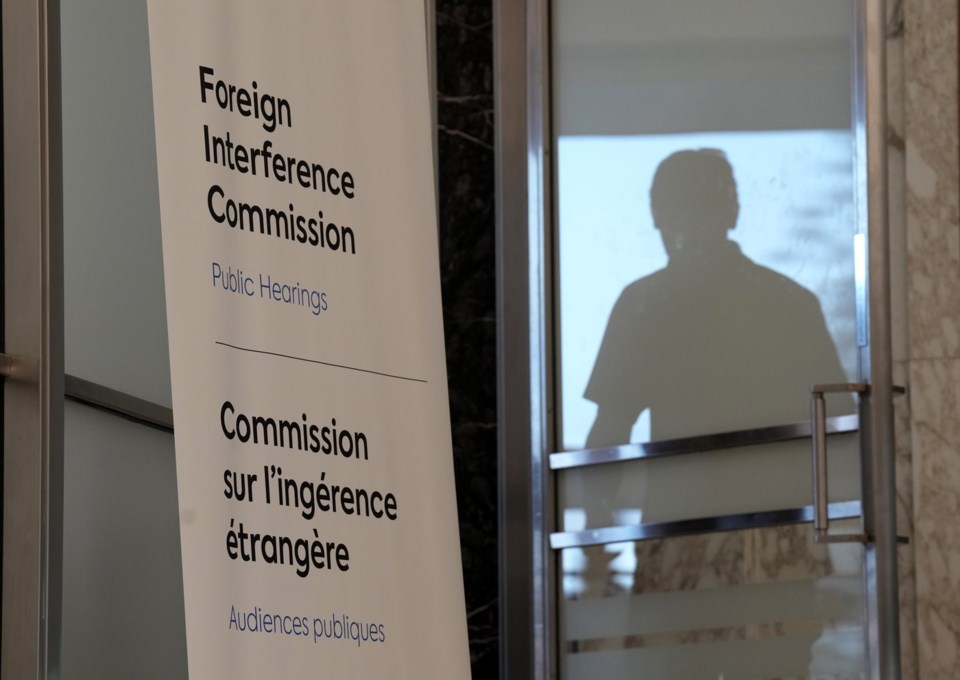OTTAWA — The Chinese community in Canada has long been caught in the crosshairs of political discourse, disinformation and propaganda originating from the Communist Party in Beijing, a media industry veteran told a public inquiry Tuesday.
If Beijing seeks to influence or interfere in Canada's democratic processes, one of its most effective tools is the Chinese-language media, said Hong Kong-born Victor Ho, who came to Canada in 1997 and worked in newspaper and radio journalism over the years.
From Toronto to Vancouver, much of the Chinese-language media operates "under the immense influence" of the Communist Party, Ho said.
The ongoing commission of inquiry's latest hearings are focusing on detecting and countering foreign meddling. A final report from the inquiry is due by the end of the year.
Ho was part of a panel of media representatives from the Chinese and Indian communities as the inquiry turned its sights to the effects of mass communication on public attitudes.
The inquiry heard claims of China putting pressure on advertisers and India denying travel documents as tactics to shape the content of narratives about their governments in Canada.
In addition to controlling traditional media, the Chinese Communist Party has also exported its digital influence through popular Chinese social media platforms such as WeChat, TikTok and Weibo, Ho said.
"These platforms are used to flood the local Chinese community with CCP narratives serving as vehicles for political indoctrination under the guise of social interaction."
Ronald Leung, host of a weekly television interview show, noted the challenges of competing with misinformation and disinformation emanating from foreign adversaries.
"We are in an information war," said Leung, who was also born in Hong Kong and came to Canada as a student in 1983.
Asked if he engages in self-censorship on the air, Leung said: "I exercise care, and I am very careful every time I talk on the radio."
Leung said he knows not to cross "the red line," because if he does, "I don't think I can continue to do my job, to present a Canadian perspective on international issues. That's how I am still working in the Chinese media."
The witnesses largely echoed a July 2023 intelligence assessment recently tabled at the inquiry that said Communist Party-friendly narratives "inundate Chinese-language media in Canada."
"Censorship (including self-censorship) is pervasive and alternative media voices are few or marginalized in mainstream Chinese-language media," said the document produced by the Canadian Security Intelligence Service and the Privy Council Office's Intelligence Assessment Secretariat. "This includes traditional media such as newspapers, and in new media provided by online platforms and applications such as WeChat."
Gurpreet Singh, who hosts a daily 30-minute talk show, told the inquiry Tuesday the government of India has compiled a dossier on him that has been used to discredit him publicly over a high-profile issue in the news.
"It's based on lot of disinformation, which is also very disturbing. They have described me as anti-India, anti-national," said Singh, who moved to Canada from India in 2001.
Singh said he has also faced backlash on social media. "I've stopped paying attention to that, anyway, because it really affects your sanity."
A senior official with Canadian Radio-television and Telecommunications Commission testified Tuesday the federal broadcast regulator plays a "relatively minor role" in identifying and countering foreign meddling.
"To my knowledge, the number of complaints that we have received specifically about foreign interference have been relatively small," said Scott Shortliffe, the CRTC's director of broadcasting.
"We are not integrated into the national security architecture so we have, at least to date, not played a major role."
Shortliffe said the CRTC has received complaints about alleged propaganda, but stressed that officials are "extremely reluctant to become the arbiter of what is true and what is propaganda."
"We've instead leaned in the direction of saying we should have pluralistic sources of information so that Canadians can make up their own minds."
This report by The Canadian Press was first published Oct. 1, 2024.
Jim Bronskill, The Canadian Press




